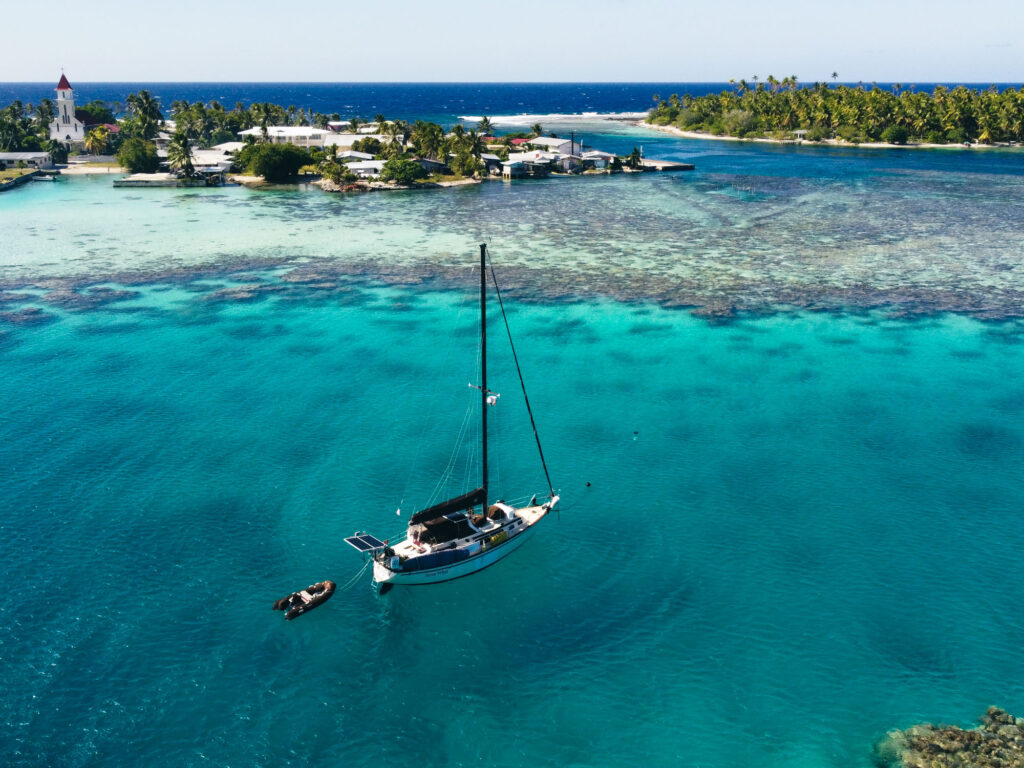Our last morning in Makemo was an early one as we prepared to depart. I jumped in the water to help retrieve the anchors and prevent them from wrapping on any rocks or coral as they were pulled in. Ideally, we would exit the Makemo pass at the slack tide, but since our window to enter the next atoll was limited, we decided to exit the atoll on the outgoing tide. This shot us out through the pass at 9 knots (normally we motor at 5 knots). It’s really interesting to see what current can do to the appearance of the water in the pass; some areas look like a flat mirror and others areas look like they are boiling. Then, once you get through the pass, there are a series of 2 to3-foot standing waves that kick the bow of the boat up and down.
The trip to Katiu was a bit windy and swelly. It was uncomfortable compared to the other sailing we had experienced since departing the Marquesas. The Danish crew slept in the cabin while Eitan and I tended to the autopilot, ready to take over in case it got overpowered. With these conditions, there was a chance we may not be able to enter the next atoll. The Katiu pass is narrow, shallow, and not well charted, which is why most cruisers avoid it all together. But Eitan likes a challenge and also likes to go places with his boat that most other people wouldn’t.
When we arrived outside the pass, there were breaking waves on either side with a good amount of swell rolling in. Eitan turned us into the wind to get the mainsail down but the swell caused us to nose dive into an oncoming set, getting a good amount of water over the bow and into the v-berth hatch. Eitan turned again and lined us up for the entry as I faced back over the stern, calling the timing and angle of the oncoming swell so he could compensate the steering to prevent us from getting thrown off line and onto the reef.
Once through the swell, we rode in with the incoming current, but Eitan needed to make a quick decision on which coral channel to choose. Neither leg was charted well, and to top it off, fish traps obstructed the deepest areas. He steered through one leg and we held our breaths as we saw the depth meter go from 10 feet to 9, 8, 7, 6… oh dear we are about to run aground on the reef. Luckily, we scooted over the shallowest section with less than 1 foot below the keel, after which the depth started to increase again.
We dropped three anchors near the town and relaxed after our adrenaline filled afternoon. The next day we went into town to see what provisions were available and to grab another jerrycan of gasoline, if we could find it. The first grocery store we found seemed to be a room in someone’s house with some shelves in it. We grabbed a couple small items and asked about where to find gasoline, pointing to our red gas can. Not speaking any English, she kept saying “license?”. Confused, we assumed that since we were in such a remote area of the world, maybe they ration fuel and you need a special license or form to purchase it. We said “No, merci” and continued on to the other grocery store.
The second grocery store was similar to the first and seemed to be set up in someone’s garage. Once again, we asked about the gasoline and got the same response: “license?”. After some gestures and a couple words in English and French, the shop keeper’s daughter ran off with our fuel tank. She returned a few minutes later with the empty tank and kept saying “license” and “gasol”, to which I responded “No license gasol” trying to tell her that I didn’t have a license to purchase the gasoline. They kept opening up the container and smelling it then repeating “license” and “gasol”. At this point, we had no idea what was going on and the shopkeeper insisted that Martin follow her daughter on her scooter and sort out this issue at the fuel station.
It turns out that gasol actually means diesel and l’essence (what I was confusing for license) means gasoline. So, I had been telling them to put diesel in our jerrycan that very much smelled like gasoline. Luckily, they didn’t oblige and we didn’t end up with an expensive mistake that could have cost us the generator and outboard!












